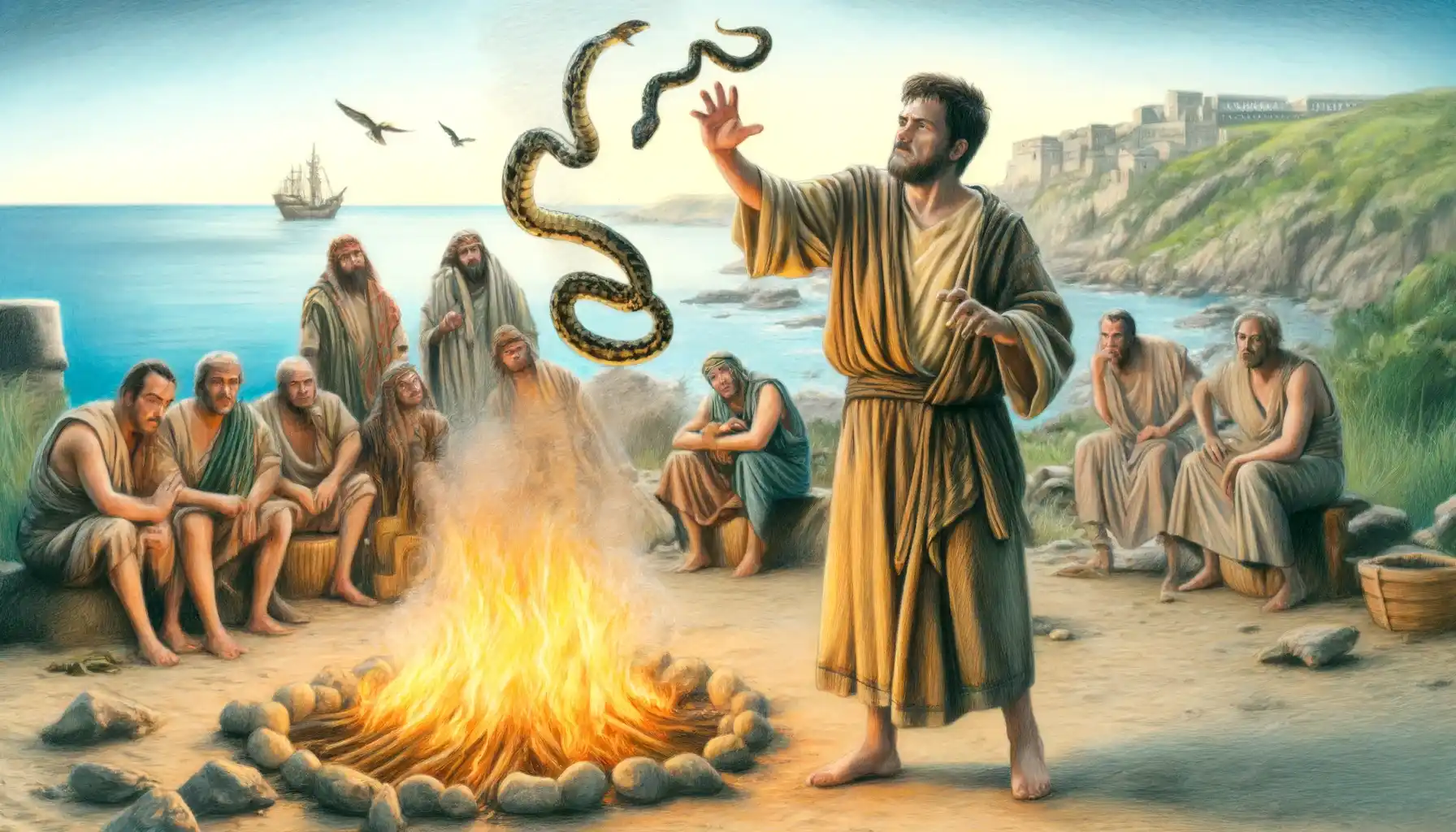
Viper Bite Does not Harm Paul
The story of Paul being unharmed by a viper bite in Acts 28:3-5 is a remarkable example of divine protection and miraculous intervention during his journey to Rome.
Short Quick Facts:
- Location: The incident occurs on the island of Malta.
- Context: Paul and his companions are shipwrecked on Malta while being transported to Rome.
- Event: While gathering firewood, Paul is bitten by a viper.
- Reaction: Paul shakes the viper off into the fire without suffering any harm.
- Impact: The islanders, expecting Paul to swell up or die, conclude he must be under divine protection.
The account of Paul being unharmed by a viper bite is found in Acts 28:3-5. This incident takes place on the island of Malta, where Paul and his companions are shipwrecked during his journey to Rome as a prisoner.
Context and Background:
Paul’s journey to Rome is fraught with difficulties, culminating in a shipwreck on Malta. The local inhabitants, known for their hospitality, welcome the shipwreck survivors. As they gather around a fire for warmth, Paul contributes by collecting firewood.
The Incident:
In Acts 28:3, it is written, “Paul gathered a pile of brushwood and, as he put it on the fire, a viper, driven out by the heat, fastened itself on his hand.” The viper, a venomous snake, bites Paul, leading the onlookers to expect a severe reaction.
Miraculous Survival:
Paul’s response to the bite is nonchalant. He simply shakes the viper off into the fire and suffers no ill effects. Acts 28:4-5 notes, “When the islanders saw the snake hanging from his hand, they said to each other, ‘This man must be a murderer; for though he escaped from the sea, the goddess Justice has not allowed him to live.’ But Paul shook the snake off into the fire and suffered no ill effects.”
Islanders’ Reaction:
The initial reaction of the islanders is one of superstition. They believe that Paul must be a criminal, specifically a murderer, who is being punished by the goddess Justice. Their expectation is that Paul will swell up or suddenly fall dead. However, when he remains unharmed, their perception shifts dramatically, leading them to believe he is favored by the gods.
Theological Insights:
- Divine Protection: Paul’s unharmed state after the viper bite is seen as a sign of divine protection. This event is consistent with Jesus’ promise in Mark 16:18 that believers would handle snakes without harm as a sign of their faith.
- Faith and Witness: Paul’s calm demeanor and lack of harm serve as a powerful testimony to the islanders. It opens the way for further ministry on Malta, demonstrating how God’s power can turn a potentially fatal incident into an opportunity for witness.
- Symbolism of Overcoming Evil: The viper, often a symbol of evil or danger, being cast into the fire without harm to Paul, can be interpreted as a metaphor for overcoming evil through faith and divine intervention.
Historical and Cultural Context:
Malta was an island with its own set of beliefs and superstitions. The islanders’ reaction reflects their cultural understanding of justice and divine retribution. Paul’s miraculous survival challenges their beliefs and opens them to the message he carries.
Conclusion:
The story of Paul and the viper bite on Malta is a powerful example of divine intervention and protection. It serves as a testament to Paul’s faith and God’s power, leading to a shift in perception among the islanders and providing a foundation for further ministry. This incident reinforces the theme of God’s providence and the unstoppable nature of Paul’s mission despite numerous obstacles.
Tag:Acts, apostle, divine protection, Malta, Miracles, New Testament, Paul, shipwreck, viper



